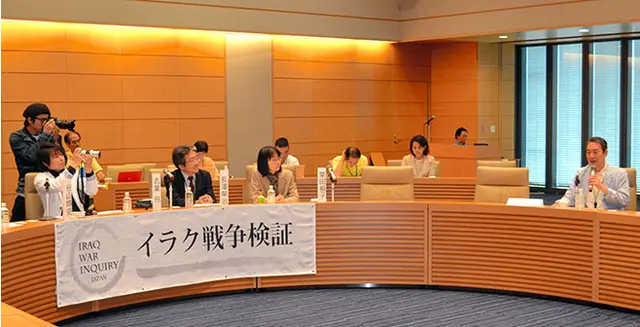As Britain’s Iraq Inquiry Report turns the world’s attention to former Prime Minister Tony Blair’s decision to go to war, a Japanese citizens group is conducting its own Iraq inquiry in lieu of a government effort.
The report on Britain’s inquiry, commissioned by its government and carried out by an independent panel, was published on July 6 and blasted the Blair administration for the decision to join the United States in invading Iraq in 2003.
But because the Japanese government does not appear likely to take a critical look at the decision by then-Prime Minister Junichiro Koizumi to offer Japan's support for the U.S.-led invasion, the citizens group Iraq War Inquiry Network has taken the initiative to hold hearings on the background to that decision of more than a decade ago.
There is added urgency for such an inquiry now because the passage of national security legislation last year by the Abe administration means that future governments will not likely just show support, but also demonstrate a "boots on the ground" mentality by deploying Self-Defense Forces personnel and equipment to support the U.S. military.
Iraq War Inquiry Network held its first session in Tokyo in late May and heard from Kyoji Yanagisawa, a former assistant chief Cabinet secretary and Defense Ministry bureaucrat who served during the Koizumi administration.
"Everyone who was working within government departments thought that what the United States was trying to do was strange, but they all stopped their critical thinking under the excuse 'This is an issue concerning the United States,'" said Yanagisawa, 69.
He spoke about the background to the decision to support the U.S.-led war against Iraq as about 80 scholars, opposition party lawmakers and others listened.
"There was likely the judgment that only the United States would protect us at that time when a major issue of concern was nuclear weapons development by North Korea," Yanagisawa said.
U.S. and British troops invaded Iraq in March 2003 on the grounds that Iraq possessed weapons of mass destruction. Koizumi was among the first to express support for the military action.
In the end, however, no weapons of mass destruction were ever found. Japan later helped in efforts to rebuild Iraq through the repairing of schools and roads.
The cost of the war was huge in human terms. One international nongovernmental organization estimates that more than 160,000 civilians died in the fighting.
Independent panels in other nations have looked into why the war was started on such weak grounds.
In 2010, a committee in the Netherlands issued a report that said the war was a violation of international law.
The 2.6-million-word report issued in Britain came after more than 120 individuals were questioned, including Blair.
Compared with such efforts, the Japanese government response has been tepid.
In December 2012, the Foreign Ministry issued a report that looked into the decision-making process in the ministry. It took up four whole pages and none of the individuals questioned were identified.
The report concluded that not being able to confirm the existence of weapons of mass destruction "had to be accepted in a grave manner."
Koichi Nakano, 46, a professor of comparative politics at Sophia University in Tokyo, said: "In Japan, there is a deep-rooted myth that the state never makes a mistake. Bureaucrats also never acknowledge errors on the part of the government."
The citizens group decided to launch its inquiry due to concerns about not only the national security legislation, but also moves by the Abe administration to amend the Constitution.
Rei Shiba, 40, a journalist who also works in the group's secretariat, said: "An inquiry is needed now when the danger has heightened of Japan being forced to cooperate in U.S. wars anywhere in the world.”
Yanagisawa also said: "With the national security legislation, Japan becoming a party to war has become a high possibility."
Iraq War Inquiry Network is expected to compile its report within the next year or two.
Political heavyweights who were in the thick of the action during the Iraq War have also begun speaking out.
Taku Yamasaki, 79, served as secretary-general of the ruling Liberal Democratic Party when Koizumi was prime minister.
Yamasaki plans to publish a book in late July titled "YKK Hiroku" (Secret files of YKK). YKK was the name taken from the initials of the last names of three LDP politicians to symbolize the close ties between them. The three were Yamasaki, Koizumi and Koichi Kato.
In his book, Yamasaki explains how he urged Koizumi to express support for the U.S.-led war because he trusted the words of then U.S. Secretary of State Colin Powell when he visited Japan in February 2003 and insisted that Iraq possessed weapons of mass destruction.
"Japan did not have the ability to reject a request for compliance made by the United States," Yamasaki said. "The problem is that Japanese diplomacy placed greater emphasis on maintaining the alliance with the United States than a U.N.-centered diplomacy."
The confusion that followed the end of the Iraq War is one of the reasons for the rise of the Islamic State terrorist group.
Yamasaki said: "Japan has a 'manufacturer's responsibility' for creating IS because it agreed to the start of the Iraq War. In that sense, an inquiry into that war is necessary."
(THE ASAHI SHIMBUN)
 简体中文
简体中文

